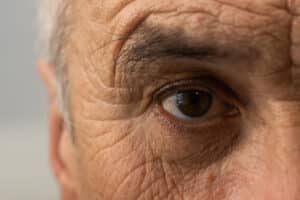
Dry eye is a common symptom for people over the age of 50. For many, the Meibomian gland stops working the way it should, causing dry eye in either one or both eyes. The meibomian gland is responsible for secreting meibum – an oily substance that stops tears from evaporating too quickly, allowing the eyes to remain well hydrated. For some elderly, the gland becomes blocked or inflamed, reducing the amount of meibum that can be released causing the eyes to feel dry and gritty. This can cause discomfort and pain in your loved one’s eyes.
If your loved one complains of dry eyes to you or his home care provider often, you should have him visit an eye specialist to see if he has meibomian gland dysfunction. While it is the main cause of dry eyes, there can be several other environmental issues that can either cause dry eyes or make meibomian gland dysfunction worse.
- Contact lens use. Those who have worn contact lenses for decades may find that as they age, they are no longer comfortable because they make the eyes too dry. Many elderly switch away from contacts to eyeglasses for many reasons, one of them being dry eye. If your loved one has dry eye and wears contact lenses, have him go for a week with only glasses to see if he feels an improvement.
- Too much screen time. Sitting in front of a computer all day can cause dry eye. If your loved one is spending too much time in front of his computer, consider offering alternatives to screen time. Many seniors find entertainment and companionship on the internet, so having a home care provider who can provide companionship during the day by playing games and enjoying conversations may pull your senior away from the screen.
- Air quality. It’s not only smoke that’ll irritate your loved one’s eyes and possibly dry them out, it’s also too much heat that makes the air too dry or even having too much air conditioning or a fan blowing air into his face all day. All of these factors will dry his eyes out, making them itchy and uncomfortable. If dry air is a problem, consider installing a humidifier to add moisture back into the air. Ask your home care provider to help keep it clean so that bacteria doesn’t build up.
- Medications. Some medications dry out the eyes, such as some anti-depressants. If you believe medications may be the problem, set up a time to talk to his doctor about the side effects to discover what possible alternatives there may be.
No matter the cause, artificial tears may provide your loved one with a lot of relief from the discomfort of dry eyes. It can also help to increase his intake of Omega-3 fatty acids and Vitamin A, both of which can promote good eye health. The next time he shops with his home care provider, have them add items like broccoli, salmon, liver, carrots, and vegetable oil to the shopping list to help increase the nutrients his body needs.
If you or an aging loved one are considering Home Care in Orinda, CA, please contact the caring staff at Aviva In-Home Care today (415) 463-1400
Aviva In-Home Care provides exceptional senior home care in the Bay Area, including San Francisco, Burlingame, San Mateo, Hillsborough, Atherton, Menlo Park, Palo Alto, Berkeley, Lafayette, Orinda, and surrounding areas.
- What You Should Know About Caring For A Parent With Alzheimer’s - May 23, 2025
- How To Help Your Senior Parent Feel Their Best Every Day - May 14, 2025
- Preventing Falls in the Yard - May 6, 2025




